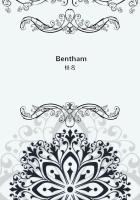Catlin, the friend of the Mandan tribe, mentions a chief who consolidated his power by aid of a little arsenic, bought from the whites. The chief used to prophesy the sudden death of his opponents, which always occurred at the time indicated. The natural results of the administration of arsenic were attributed by the barbarous people to supernatural powers in the possession of the chief. Thus the philosophy of savages seeks causas cognoscere rerum, like the philosophy of civilised men, but it flies hastily to a hypothesis of "supernatural" causes which are only guessed at, and are incapable of demonstration. This frame of mind prevails still in civilised countries, as the Bishop of Nantes showed when, in 1846, he attributed the floods of the Loire to "the excesses of the press and the general disregard of Sunday". That "supernatural" causes exist and may operate, it is not at all our intention to deny. But the habit of looking everywhere for such causes, and of assuming their interference at will, is the main characteristic of savage speculation. The peculiarity of the savage is that he thinks human agents can work supernaturally, whereas even the Bishop reserved his supernatural explanations for the Deity. On this belief in man's power to affect events beyond the limits of natural possibility is based the whole theory of MAGIC, the whole power of sorcerers. That theory, again, finds incessant expression in myth, and therefore deserves our attention.
Catlin, Letters, ii. 117.
The theory requires for its existence an almost boundless credulity. This credulity appears to Europeans to prevail in full force among savages. Bosman is amazed by the African belief that a spider created the world. Moffat is astonished at the South African notion that the sea was accidentally created by a girl.
Charlevoix says, "Les sauvages sont d'une facilite a croire ce qu'on leur dit, que les plus facheuse experiences n'ont jamais pu guerir". But it is a curious fact that while savages are, as a rule, so credulous, they often laugh at the religious doctrines taught them by missionaries. Elsewhere they recognise certain essential doctrines as familiar forms of old. Dr. Moffat remarks, "To speak of the Creation, the Fall and the Resurrection, seemed more fabulous, extravagant and ludicrous to them than their own vain stories of lions and hyaenas." Again, "The Gospel appeared too preposterous for the most foolish to believe". While the Zulus declared that they used to accept their own myths without inquiry, it was a Zulu who suggested to Bishop Colenso his doubts about the historical character of the Noachian Deluge.
Hearne knew a Red Man, Matorabhee, who, "though a perfect bigot with regard to the arts and tricks of the jugglers, could yet by no means be impressed with a belief of any part of OUR religion".
Lieutenant Haggard, R.N., tells the writer that during an eclipse at Lamoo he ridiculed the native notion of driving away a beast which devours the moon, and explained the real cause of the phenomenon. But his native friend protested that "he could not be expected to believe such a story". Yet other savages aver an old agreement with the belief in a moral Creator.
Vol. ii. p. 378.
Missionary Labours, p. 245.
Callaway, Religion of Amazulus, i. 35.
Journey among the Indians, 1795, p. 350.
We have already seen sufficient examples of credulity in savage doctrines about the equal relations of men and beasts, stars, clouds and plants. The same readiness of belief, which would be surprising in a Christian child, has been found to regulate the rudimentary political organisations of grey barbarians. Add to this credulity a philosophy which takes resemblance, or contiguity in space, or nearness in time as a sufficient reason for predicating the relations of cause and effect, and we have the basis of savage physical science. Yet the metaphysical theories of savages, as expressed in Maori, Polynesian, and Zuni hymns, often amaze us by their wealth of abstract ideas. Coincidence elsewhere stands for cause.
Post hoc, ergo propter hoc, is the motto of the savage philosophy of causation. The untutored reasoner speculates on the principles of the Egyptian clergy, as described by Herodotus. "The Egyptians have discovered more omens and prodigies than any other men; for when aught prodigious occurs, they keep good watch, and write down what follows; and then, if anything like the prodigy be repeated, they expect the same events to follow as before." This way of looking at things is the very essence of superstition.
II. p. 82.
Savages, as a rule, are not even so scientific as the Egyptians.














